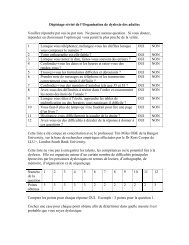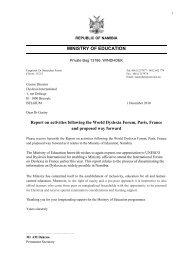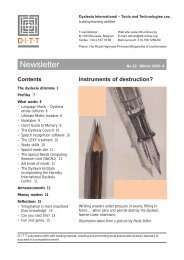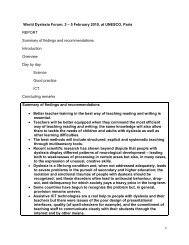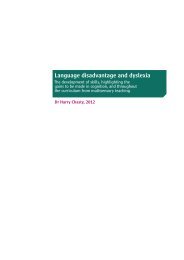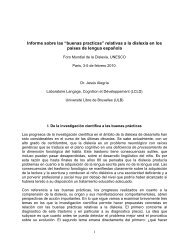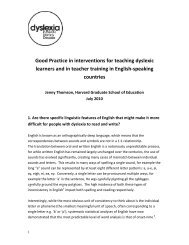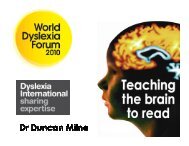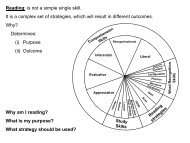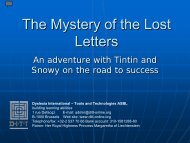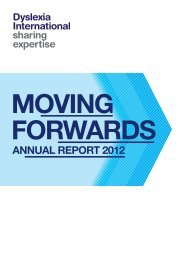Reading - Dyslexia International
Reading - Dyslexia International
Reading - Dyslexia International
Create successful ePaper yourself
Turn your PDF publications into a flip-book with our unique Google optimized e-Paper software.
Society and <strong>Dyslexia</strong>Lars Schmidt standing in front of the Knippelsbro(Knippels bridge), Copenhagen, DenmarkI am studying social sciences and I am dyslexic so I feel strongly that I should drawattention to the social problems a dyslexic may encounter.In my university studies I work to:- change awareness and show how this invisible disability can alienate people fromsociety, especially the labour market;- create a more stable structure where dyslexics can exert influence and become involvedin civil projects;- invest in civil projects, because the gifts of the dyslexic can be effective in a competitivemarket.First, I personally believe that one should change the implicit derogation behind the word“dyslexia” as some kind of weird thing to, simply, dyslexia, which is a condition. With toolsnow available they are no longer word-blind. <strong>Reading</strong> programs provide an opportunity touse other multisensory modalities to learn.I think that many dyslexics get lost in the system, since the availability of help is not welltargeted. It is only when one migrates from exclusion to inclusion in the system does onefeel more fortunate.I would like to help develop in dyslexics an ability better to cope in society. To this end Iam working to organize a major festival called <strong>Dyslexia</strong> - Now in Copenhagen, Denmark,in 2015.<strong>Dyslexia</strong> - Now will work for inclusion of dyslexics in Danish society. Postmodern societyis characterized by a kind of reflexive responsiveness, which means that each dyslexic isnot able to overcome complexity and then manoeuvre in society. The consequence is thatmany dyslexic talents will never be discovered.1
I am working together with the University of Copenhagen to raise funds for this 16-dayfestival. In addition I would like to explore possibilities for joining up with other dyslexiaassociations as co-organizers and sponsors.For the place, I have been allowed to use University facilities, Christiania's Ibyens Lightand Culture Tower on Knippelsbro.The basic idea for <strong>Dyslexia</strong> - Now is to make a concerted effort about dyslexia, engageunemployed dyslexics and provide a framework for an exciting festival for all the citizens ofthe city. During the 16-day long festival program in Spring 2015 there will be exhibitionsand lectures on dyslexia covering a historical perspective, educational thinkers (Cold,Grundtvig and Steiner) and known dyslexics, and last but not least, a presentation byarchitect and dyslexic Richard Rogers. Today’s education system often brands dyslexicsas ‘stupid’ and ‘lazy’ – we will show the opposite.I am a sociologist and was 35 years old before I was diagnosed with dyslexia in theDepartment of Sociology, University of Copenhagen. My life has been colourful, but alsoan enormous challenge because my head has always contained a huge mess of images. Ifear losing my grip on life and being powerless in what I do. My emotional life has beendisturbed because I knew I was dyslexic.I dreaded being a rat flopping aimlessly around society's parking lots owing tounemployment; my projects have failed. But, based on their own experiences dyslexicsneed formal obligations and a sense reliability, commitment and purpose. All these valuesare long-term. All we can hope for in the job market is intermittent work. This makes thedyslexic lose the linear sense of time. We want a long-term, complete life story and not berendered dysfunctional compared to the competition in the labour market. How can wepursue long-term objectives in a short-term society? How can lasting social relationshipsbe created and maintained? How can a dyslexic with a collage of episodes and fragmentscarve out a story about identity and life in a society that does not understand him or her?If I had to formulate the biggest dilemma for dyslexics I would say that the short-termruthless commercialism threatens to undermine the very nature of the dyslexic, especiallythe characteristics that bind people together and could offer a bountiful society whichendows a sense of happiness and sustainable self. If the world were a happier and fairerplace to live in people would enjoy greater respect. But in real life matters are not so welldisposed.Therefore, in conclusion, we dyslexics will fight the battle of the labour market. We shallfiercely resist exclusion and will not lose our footing. Dyslexics should promotecharacteristics such as loyalty, commitment, perseverance and determination that arebased on long-term social relationships and oppose the less admirable features of society.Lars Erik Lyndgaard Schmidtlels(at)ruc.dk; https://www.facebook.com/knippelsbro2



